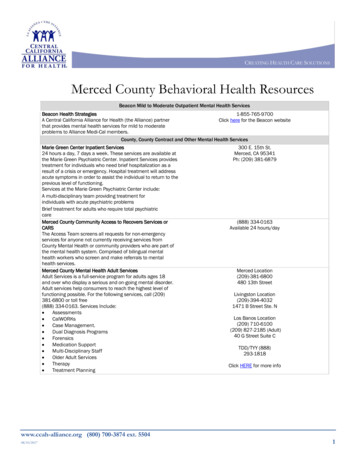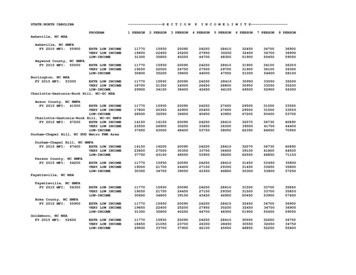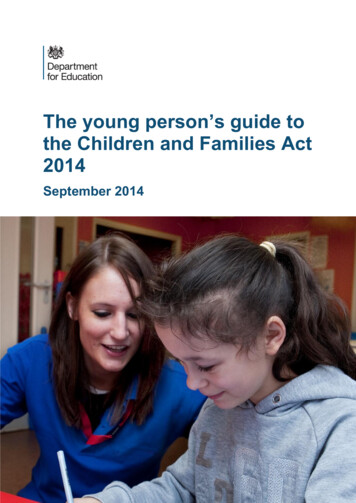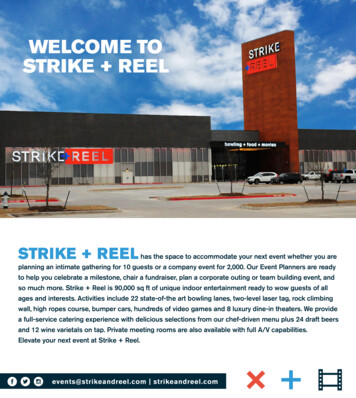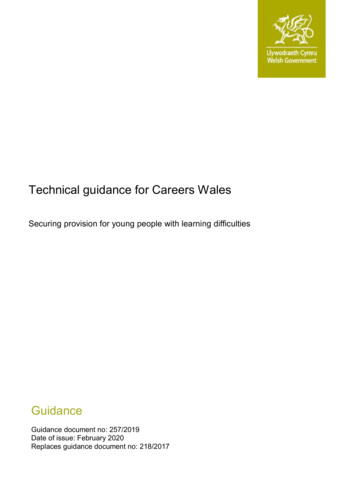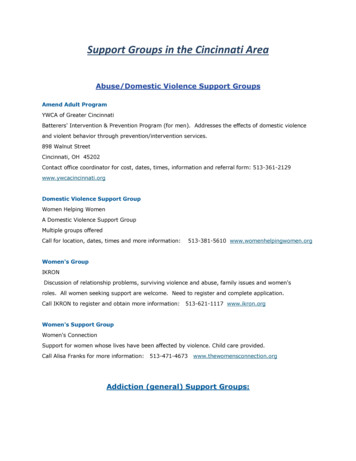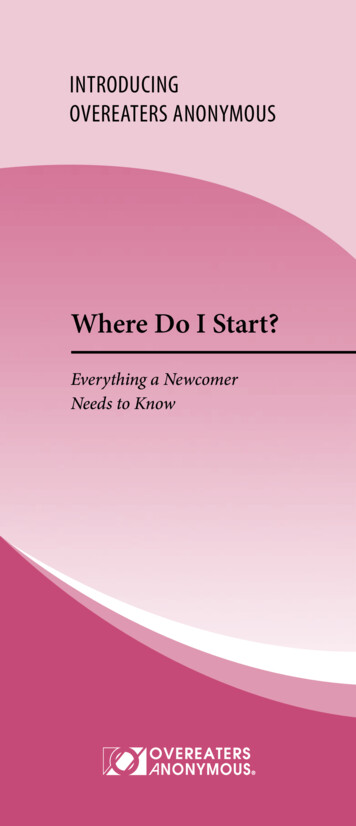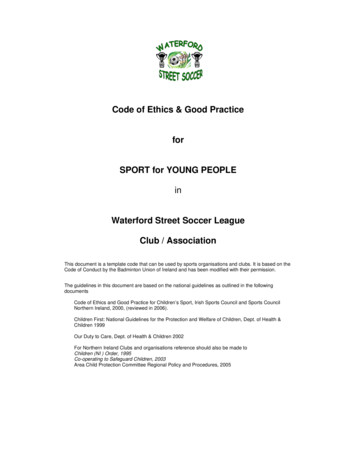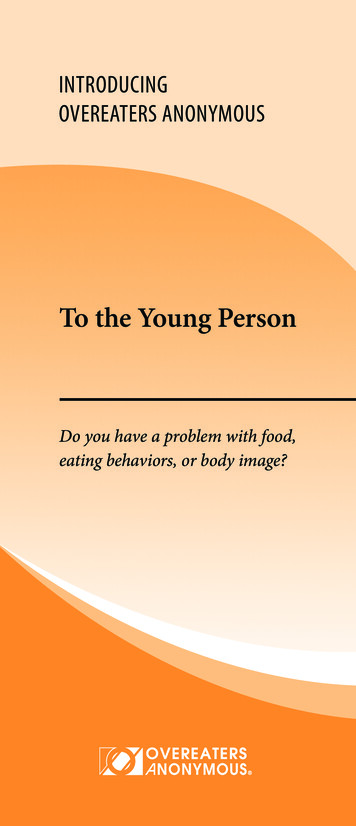
Transcription
INTRODUCINGOVEREATERS ANONYMOUSTo the Young PersonDo you have a problem with food,eating behaviors, or body image?
If you’re reading this, you mayalready think so. Asking yourself thefollowing questions can help you seehow food issues affect your life:Yes No1. Do my eating habits change depending on my feelings? 2. Am I unhappy or frustrated with myeating habits or body size, or withmy attempts to control them? 3. Do I sometimes feel I can’t stop eating even though I want to? 4. Do I often eat more (or less)than most people do at a meal orthroughout the day? 5. Do I eat large amounts of food evenwhen I’m not physically hungry? 6. Do I eat normally in front of othersbut eat excessively, or avoid eating,when I’m alone? 7. Do I spend a lot of time thinkingabout my body size? 8. Do I try to control my body size byfasting, purging, using laxatives, orexercising for long hours? 9. Do thoughts of food or my bodyimage take up too much of my timeand energy? 10. Do my eating habits, body size, orfeelings of shame about how I looklimit my social life? 11. Do I avoid physical activities because of how I feel about my body? 12. Do I sometimes sneak food or stealmoney to buy it? 13. Do I lie about how much I eat ordon’t eat? 14. Have I been told that I really oughtto eat more (or less)? 15. Do I wish people wouldn’t comment about my body size or eatinghabits?
If your answer to any of these questions isyes, you’re not alone. Many, including youngpeople, suffer from the disease of compulsiveeating, whether they are an overeater, a bulimic,or an anorexic. Whether you call the problem aneating disorder or a disease, the good news is thatthere is a solution.Overeaters Anonymous is a Fellowship of individuals of all ages who support each other in overcoming compulsive eating by working OA’s TwelveSteps of recovery.Most of us, no matter how hard we tried, couldnot control our eating behaviors. In OA, we foundpeople who understood us and gave us the help weneeded through the Twelve Steps of OA. We stoppedour compulsive food behaviors, took action torestore our health, and learned to maintain a healthyweight and life. We find that, so long as we practicethe Twelve Steps, we seldom have any desire toreturn to our former eating behaviors.OA is not a diet club. The only requirement formembership is a desire to stop eating compulsively.We don’t weigh members. We don’t charge dues orfees. We don’t track attendance. We don’t tell youwhat you should or should not eat. In OA, we helpeach other make responsible choices about our food(such as which foods and the amounts to eat), howwe behave with food (such as when and where to eat),and other aspects of our lives. Sometimes we find thatwhat is eating us affects how and what we eat.OA’s Twelve Steps have helped thousands of people of all ages find new, healthy ways of dealing withfood and life. The Twelve Steps can help you freeyourself from the prison of food obsession, just asthey have helped the young people who wrote thefollowing stories.AshleyI’m Ashley G., and I’m a compulsive eater andfood addict. I entered OA as a young person at 22.Since the age of 10 or 11, I had gained 8 to 10pounds (3.6–4.5 kg) a year. My weight steadily increased to my top weight of 250 pounds (113 kg)1
by age 20. This means that, had I not been ableto stop, I may have weighed well over 350 to 400pounds (136–181 kg) by age 30! Some of my earliest memories of compulsive overeating includeeating all of my and my brother’s holiday candywithin two or three days of receiving it. I also recall eating fast food two to three times a week,generally after evening activities. Compulsiveeating affected me physically because I experienced more and more weight gain and pain andfatigue related to my chronic illnesses.My food addiction caused me emotional anguish. When I ate, I medicated my feelings. WhenI did feel, I felt anxious, depressed, worthless, andself-loathing. I thought of myself as rejected, marginalized, and condemned. I remained ungratefuland worried excessively. My life was insane andunmanageable. Furthermore, this disease robbedme spiritually. I “prayed” to the food and for thefood. It was my Higher Power. I had little conceptof spirituality.I came to OA after my junior year of college. Itwas the first time I identified with other compulsive overeaters. During my first year of abstinencefrom compulsive overeating, I became employedin my career field, mended old relationships andstarted new ones, dated for the first time, andlearned to have fun. I was happy, joyous, and freewithout food! I experienced love and serenity.In my second year of abstinence—with thelove, care, and support of God, my sponsor, andthe OA Fellowship—I endured and perseveredthrough a significant trauma. I have multiplechronic illnesses, which I have had since myteenage years. An incapacitating flare-up resultedin my disability at age 25. I lost my ability to begainfully employed; my income; my ability tocare for myself physically; my independence; mynew happy, joyous, and free life I had developedin OA; and my safe, secure, planned future. Ibecame severely depressed and plummeted intofear, anger, and self-pity. I was stripped down tomy core; I was bent and stretched to a breakingpoint. But I did not overeat! I knew and believedthat returning to my former compulsive eating2
ways would only compound my already hard,messy, seemingly hopeless circumstances.Connecting was a solution for maintainingabstinence. My sponsor suggested two phonemeetings a week and three recovery calls a day.Her suggestions were the lifeline I needed toremain abstinent and manage the depression.As a result, I became restored at age 26. Igained the ability to sustain abstinence year afteryear; to serve and lead; to work part-time andvolunteer with children; to have fun with familyand friends; to play the piano and tap dance; to bein a relationship; to have peace, be grateful, andexperience freedom; to love and be loved; andalso to turn my will and my life over to the care ofmy loving God in exchange for the power to carryout his will.I am currently 30, maintaining nearly six yearsof back-to-back abstinence and a 100-pound (45kg) weight loss. I eat five weighed-and-measuredmeals a day with nothing in between and abstainfrom binge foods. I write and text my plan ofeating to my sponsor daily.As I journey through my sixth year of abstinence, I am no longer gaining excessive weightbrought on by compulsive eating and food addiction. Instead, I am gaining a life beyond my wildest dreams brought on by abstaining one day at atime and practicing the Principles.JoeWhen I was born, I couldn’t eat. This worriedmy parents because I began losing weight insteadof gaining it. They took me to a doctor who, afterexamining me, told them that my stomach wasnot yet developed.My folks took me home and fed me with ateaspoon until our ordeal was finally over andI could eat on my own. Naturally, my ability toeat pleased my mom and dad very much. In fact,they were so happy, they continued to encourageme to eat.And eat I did. I ate until I was fat. I hated beingfat, so I ate to feel better. I didn’t have any friends,3
and people made fun of me, so I ate because ofthat too. I ate because of anything—or nothing.When I started school, things got worse. I wasjust “fat” before; now people said I was both “fatand ugly.” It was terrible being fat, but I had neverthought about being ugly.The older I got, the worse things got. I felt asthough I was living in a nightmare. Even my ownfamily said bad things about me.When I was in the second grade, three of mycousins came to live with us. Whenever I triedto play or do something with them and my sister, they said, “You’re too fat to do this,” or “Hey,Fatty, stay down there and help lift things up. Thatway if you fall the big boom won’t be so loud.”I tried to ignore their remarks, but they hurt. Itdidn’t seem fair that I was fat, and all my relatives—my mother, father, sister, cousins, uncles, aunts—were thin. I was the only fat one in the family.I came to Overeaters Anonymous when I wasnot quite 13, weighing 151 pounds (68 kg). I hadtried many diets, but none of them helped mekeep any weight off. I was a wreck physically andin every other way. Here I was, a boy not yet in histeens, wearing the same size pants as my father.There were rips in all my shirts because I keptgrowing out of them.I was scared when I walked in the door ofmy first OA meeting. Then, when I sat down, Ithought everyone was weird. Now, after all themeetings I’ve gone to and all the help I’ve gotten,I know that if everyone at the first meeting wasweird, then I was too. I’m just like them; I havethe same disease.Now, I don’t think these people are weird at all.I think they are sweet, and with the help of OA,I changed. From a kid with no friends, I becameone with many friends. My nickname changedtoo, from “Fatty” to “Baggy Pants”—and then to“Slim.” I love every minute of these nicknames.CarolineMy name is Caroline. I’m 21 years old, and Ijoined OA nine years ago, when I was 11. I found4
out about OA because my mom is involved, andI still remember her finally saying yes to my firstmeeting.I was always the child who constantly asked fordessert, hid my candy eating from my parents,snuck food into my room, ate all of the snacks inmy friends’ pantries, etc. Then, one day my momand I were talking, and I said something to theeffect of “I could stop eating sweets whenever Iwant to. I just don’t want to.” So, she made meput my money where my mouth was and offereda challenge: to not eat sweets for an unspecifiednumber of days or weeks—until she announcedthat the “sweets fast” had ended. I asked everysingle day whether it was over, and when it wasover, you better believe I ate a ridiculous amountof sugar. About a year later, I finally realized whatshe was talking about: I had a problem, I couldn’tstop when I wanted to, and I needed help.I want to start my story sharing about the rewards of OA, because a lot of the young person–relevant part of my story is not necessarily full ofgratitude. It’s hard to be young in OA! And muchof my story has nothing to do with my age, sowhat I’m sharing is not necessarily the full pictureof my experience in recovery.So, what do I love about OA? What gifts hasit given me? Oh goodness, I could write a book.First of all: Freedom! Freedom from myself, freedom from my fears, freedom from the ball andchain that was food, freedom from other people’sopinions the list goes on and on. Second: Gratitude. Gratitude for this overeating problem, gratitude for unlikely friendships, gratitude for gettingto hear others’ experiences without their advice,gratitude for the freedom I have received, andgratitude for a Higher Power who is by my side.Another gift OA has given me is a toolbox full ofresources: people, phrases, prayers, slogans, exercises, workbooks, and books to help me througheverything. From feeling like eating that slice ofcake on my birthday, to wanting to punch mybrother, to crying in the bathroom stall of my highschool, I can use the OA Tools in every situation.If you keep coming back, you’ll see what I mean.5
I have used many Tools over the years, including reading the Big Book, which I downloaded onto my phone and could not recommend more! I was on a road trip once withoutany recovery friends, and I felt uncomfortablemaking a phone call in that circumstance, but Idid send texts to my sponsor and read story afterstory in the Big Book to stay abstinent on thetrip. I also use the Tool of writing a lot; diaries,worry journals, or even word-vomiting all of mydaily plans and current feelings to my sponsorare tools that have helped me grow in my recovery and keep me abstinent.I also have a food plan, which has been revisedas needed, and I commit my food to my sponsorearly in the day when I’m able. Being a youngperson without a stable schedule can make it hardto have a routine for my eating, so when thingsare stressful, or I have no idea what is coming inmy day (or who is feeding me), that flexibilitywith my sponsor is so important to me and myrecovery.What is easy about being young in OA? I canmake friends in a new meeting easily becauseeveryone wants to talk to me! Also, I get to listen with extreme gratitude to my fellow members’ long leads because I was spared many ofthe hardships that come with being in the gripof food obsession for decades. I also get someamazing opportunities to speak at differentevents because of my more uncommon perspective, which is so rewarding.Being young in OA also opens the door to awhole new demographic of compulsive eatersstill suffering that OA alone can’t always reach:young people. When I got to college, I decidedthat I would answer honestly whenever someoneasked me “Why don’t you eat sweets?” Within thefirst month of classes, I brought someone new toan OA meeting. And that one person getting helpwas encouragement to me to continue answeringthat question honestly, because I want to sharethat hope with other compulsive overeaters whoare still suffering. I want to work Step Twelve.It’s incredible what kind of impact I make just6
because I have a compulsive overeating problem.Who knew?In many ways, being young in OA is only a bigdeal if you choose to make it one. Just as everyonein the meeting has life experiences relevant tomine, I have life experiences relevant to theirs,and connecting with what is shared in meetings isnever a challenge for me. Using Q-TIP is helpfulfor me, because if I choose to Quit Taking ItPersonally, I will have a more pleasant experience.Being young in OA is also a wonderful andspecial platform I have used to help both my peerswho are suffering from compulsive overeating andmy fellow OA members who are concerned abouttheir children. I work my program in a very similarway as most others: learning as I go, attendingbusiness meetings, having a food plan, workingthe Steps, and going to meetings. I have been ableto benefit from the wisdom of older members,to help break down barriers between older andyounger members, and most importantly, to findrecovery. I’m so grateful to have skipped overthe hardships that come with being a sufferingcompulsive overeater as an adult, and God willing,one day at a time, I will continue to be a gratefulrecovering compulsive overeater.AliceWhen I came to OA, I was 25 years old andvery resentful at life for bringing me here soyoung. I envied members who had arrivedwhen they were 40 to 50 years old because theyhad way more time than me to eat my triggerfoods—those foods I’m addicted to and can’tstop eating after I start. How could I stop eatingthem at 25? It was too soon! What about whenI get married? Could I seriously have a weddingwithout the cake I had dreamed about for years?What was the point of getting married at allthen? And what about kids? Could I be a goodmother without baking cookies? Won’t my children love someone else’s mom who bakes morethan me? And, most of all, how will I handleparties with people my own age, where I used to7
eat a lot to feel comfortable and have somethingto talk about with them? Food was part of myidentity. What would be left of me without it?Reluctantly, I kept coming back to meetingsanyway and making phone calls to other members, as had been suggested to me. Those peoplehad something magical, greater than me, evenif I couldn’t put my finger on it, and a part ofme wanted it, even if the other part was fightinghard to resist the program. Then, one day, a calmvoice inside of me made me realize that therewould never be enough of my trigger foods inthe whole world to satiate the pit in my stomach.So why not start abstaining right now? It was asgood as any other moment. I took a sponsor,bought some literature, and started working theSteps of OA with her.Today I’m 29, and I recently celebrated threeyears of abstinence. I feel lucky to have found OAso early because I get to grow up in this beautiful program with great Spiritual Principles andhave stopped damaging my body in time. I finallyfound a blueprint for living that I thought everybody had but me. I’m not missing out on life; I’mfully living it. I don’t go to parties just for the foodanymore. I don’t try to be someone else to fit intoa group of people. I have real friends and deep,meaningful relationships. I don’t have to lie to myfriends because they understand me. I’m less andless ashamed of who I am and of my weaknesses.I’m starting to feel like I’m part of the human raceand tenderly laugh at my shortcomings. I’m evenlearning that I have good qualities and somethingto contribute to this life. My confidence is beingbuilt, one day at a time.Food is back in its place: fuel for my body. It’snot my god, my best friend, or my lover anymore.Hope is back in my life because I know I don’thave to go through anything alone. I have the Fellowship of OA, a sponsor, and a Higher Powerto guide my steps and support me. I don’t worryabout my wedding cake anymore. I want to getmarried for love and life partnership now. And Ibelieve that, thanks to this program, I’ll be a loving mom, with a thousand other ways than food8
to show it. I get way more from OA than I couldhave imagined, and for that, I am forever gratefulto have been brought to program so young.BryanI am Bryan V., currently 26 years old with twoand a half years in Overeaters Anonymous andvery grateful to have found OA.I heard about OA when I was 22, when I couldnot walk the mile it took to get to class or walkaround campus from class to class. My daily life ofliving on negative calories, eating one and a halfmeals a day, and compulsively running 5 to 10miles (8–16 km) a day had taken a huge toll on mybody: I had a body mass index of 17, I’d experienced sudden cardiac arrest, and I had developedstress fractures and arthritis from the knees down.My physical exhaustion also included involvement in seven student organizations (and havingpositions of responsibility in five), being a fulltime student, and working in biological researchon campus. I was an anorexic and exercise addictwho placed everyone else’s priorities above myown because it gave me excuses to neglect meals.When my body forced me to stop, I withdrewfrom classes, quit exercising, and dropped out ofsome of my clubs.This was also when I started binge eating. Inmy head, it seemed like the only way I couldgain weight to survive my anorexia. Fortunately, someone at my school’s student health officewho was a recovering member of OA suggestedI would benefit from OA and invited me to attend meetings. I didn’t enter a meeting, though,until two years later. I didn’t think OvereatersAnonymous would work for me. In fact, when Ientered OA, I believed my food binges were theonly thing keeping me alive and that OA wouldleave me defenseless against my anorexia.I came into OA adamant that I was not a compulsive overeater. I thought I just had to find away to feel okay about being at a normal weight.I truly had no clue at the time that I was addicted to certain foods or that I used food to cope9
with life. I didn’t realize that I had already triedto stop eating sugar when I was 18 and be glutenfree at 23, and I couldn’t do either one for even aday. Nor had I connected my heart problems tomy BMI or realized that I was at risk of developing diabetes and following in the footsteps of mygrandfather who died of it.Once I recognized that food has always beenmy solution and grasped the spiritual significance of this, I saw that I could no longer letmy decisions be powered by my anorexic foodphobias and an obsessive list of “don’ts.”Today, I do not have the luxury of using compulsive overeating to save myself from anorexia,and I can’t use anorexia to fix my compulsiveovereating. I’ve also accepted that there are foodsI just cannot eat because of my family’s historywith diabetes, and I see how high-calorie, easyto-eat foods had allowed me to live a fast-pacedlife that threatened my health and gave me excuses to miss meals. Now, my abstinence means thatI don’t get quick fixes; the solution requires myeffort and attention and will take time. My actionplan is about planning meals, preparing healthyfood, and making sure I have that food with me.In OA, I’ve found family in people whom Inever would have expected. Before OA, I neveraccepted others because I could never acceptmyself. I made decisions about them and whatI imagined they thought of me and immediatelyrejected them. I tried to play to what I thoughtothers wanted from me and hid behind the liesthat I created to gain acceptance.The disease of being compulsively unhealthywith food is cunning, baffling, powerful, andpatient, and it can hit anyone, regardless of age,and make them powerless. I am fortunate tohave had experiences that led me quickly to desperation. I truly do not know how my God gotthrough my fog of diseased judgment.Because of OA, I have been able to keep myfirst full-time job for over two years now. I washired three months after I entered OA, and without stability in my eating, I would not have beenable to keep up with the physical demands of my10
work. Before OA, I had never expected to live past25. Now, with over two years of abstinence, I havegrown and become teachable. I sponsor othersand am humbled to be of service. Amongst otherthings, I am grateful to be a recovering compulsive overeater, living in freedom.OliviaOA saved my life—or maybe I should say OAis saving my life, one miraculous day at a time.I will celebrate my 21st birthday in May. Thisis a birthday I never thought I’d see because I’dpushed the self-destruct button for most of myteenage years. A family member introduced meto OA meetings and the Fellowship when I was11. My early moments in OA planted a seed thathas finally started to bloom.During my youth, I knew I had a disease—justknowing that is unusual. Most of my OA familysays I’m lucky to have found recovery at such ayoung age. But let me tell you, nothing spoils abinge like OA! I never went to diet and calorieclubs because I knew they were a waste of timeand money. OA had the answers. The TwelveSteps could, if I was willing, rescue me fromdeath by food.Nevertheless, I carried on with secret eating andmorning-to-midnight binges, feeling consumedand almost possessed by thoughts of food. I was asugar junkie. I often tell my home group that theonly time I’d break into a run was for a “fix.”I’d purge by vomiting and using laxatives,with varying frequency. Then, around Marchof last year, I discovered the pain and brutalityof anorexia. I am a complete, qualified addict. Ihad to check off the whole list of compulsive eating behaviors and be sick of my own reflectionin the toilet bowl before I was ready to take theFirst Step.I’m now on Step Four, attempting to write myfirst “searching and fearless moral inventory” ofmyself. It’s hard work, and believe it or not, I’veracked up plenty of pain, resentment, shame, andfear in my illness.11
What does all this equal? Gratitude! I amgrateful for my life today, for being able tostand up in the morning, and for being part ofa program that can love and support me backto sanity. I make no bones about it: I was insanewithout OA. My bond with my Higher Powerbecomes stronger every day I stay abstinent, don’tbeat myself up, and let Higher Power run my life.I often felt like I was born without life’s instruction manual. It would fascinate me to seeothers get it right while I got it so wrong. Now Ihave found the instruction manual; I just had towork it because I’m worth it, of course! We arethe lucky ones; we have a Twelve Step programof recovery.There is a solution!One of the things these young OA membershave in common is that they didn’t do it alone. Youdon’t have to either. Overeaters Anonymous willgive you the Tools you need to abstain from compulsive eating and compulsive food behaviors.At meetings, you’ll find others who understand what you’re going through and are willingto share what they have. A sponsor cares especially about you and will share their experiencein living and abstaining, one day at a time, usingthe Twelve Steps of OA.Phoning, texting, and emailing keep you intouch with your sponsor and other OA members. The phone is particularly important whenyou feel tempted to engage in your compulsion,want to share a problem, or just feel like talking.Anonymity in OA is the promise of privacy.We guard each other’s identity. What you shareat a meeting stays there. What you share withanother member goes no further. Who we seeat meetings is held in confidence. OA is a safeplace where you can be who you are.Can you do this? Yes, you can. We ask onlythat you be honest, open-minded, and willing,and that you keep coming to meetings. We thinkyou’ll feel at home in OA. You don’t ever have tostruggle alone again.12
The Twelve Steps1. We admitted we were powerless overfood—that our lives had becomeunmanageable.2. Came to believe that a Power greaterthan ourselves could restore us to sanity.3. Made a decision to turn our will andour lives over to the care of God as weunderstood Him.4. Made a searching and fearless moralinventory of ourselves.5. Admitted to God, to ourselves and toanother human being the exact natureof our wrongs.6. Were entirely ready to have Godremove all these defects of character.7. Humbly asked Him to remove ourshortcomings.8. Made a list of all persons we hadharmed, and became willing to makeamends to them all.9. Made direct amends to such peoplewherever possible, except when to doso would injure them or others.10. Continued to take personal inventoryand when we were wrong, promptlyadmitted it.11. Sought through prayer and meditationto improve our conscious contact withGod as we understood Him, prayingonly for knowledge of His will for usand the power to carry that out.12. Having had a spiritual awakening as theresult of these Steps, we tried to carrythis message to compulsive overeatersand to practice these principles in allour affairs.Permission to use the Twelve Steps of Alcoholics Anonymousfor adaptation granted by AA World Services, Inc.
How to Find OAVisit the OA website at www.oa.org,or contact the World Service Office at 1-505-891-2664.Many directories also include local listingsfor Overeaters AnonymousOvereaters Anonymous World Service Office6075 Zenith Court NERio Rancho, NM 87144-6424 USAMail Address: PO Box 44727Rio Rancho, NM 87174-4727 USATel: 1-505-891-2664 Fax: 1-505-891-4320info@oa.org www.oa.org 1980, 2010, 2020 Overeaters Anonymous, Inc.All rights reserved.#280
without food! I experienced love and serenity. In my second year of abstinence—with the love, care, and support of God, my sponsor, and the OA Fellowship—I endured and persevered through a significant trauma. I have multiple chronic illnesses, which I have had since my teenage years. An incapacitating flare-up resulted in my disability at .


